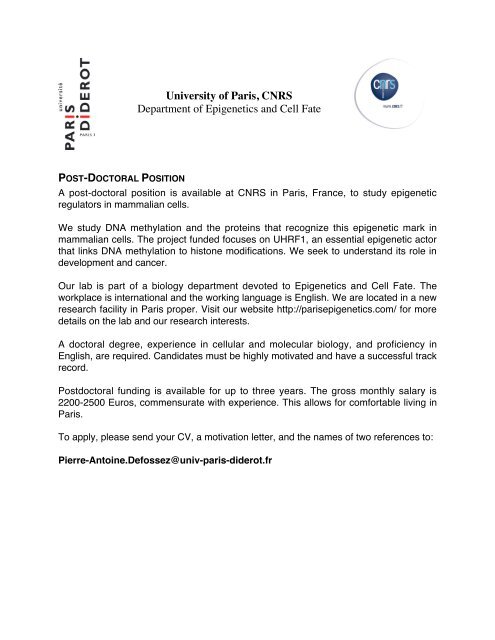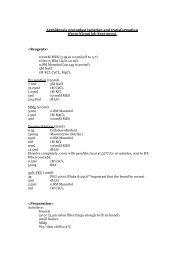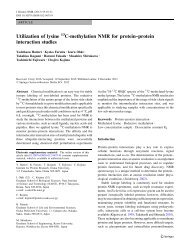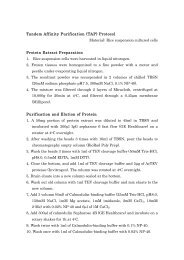University of Paris, CNRS Department of Epigenetics and Cell Fate
University of Paris, CNRS Department of Epigenetics and Cell Fate
University of Paris, CNRS Department of Epigenetics and Cell Fate
Create successful ePaper yourself
Turn your PDF publications into a flip-book with our unique Google optimized e-Paper software.
<strong>University</strong> <strong>of</strong> <strong>Paris</strong>, <strong>CNRS</strong><br />
<strong>Department</strong> <strong>of</strong> <strong>Epigenetics</strong> <strong>and</strong> <strong>Cell</strong> <strong>Fate</strong><br />
POST-DOCTORAL POSITION<br />
A post-doctoral position is available at <strong>CNRS</strong> in <strong>Paris</strong>, France, to study epigenetic<br />
regulators in mammalian cells.<br />
We study DNA methylation <strong>and</strong> the proteins that recognize this epigenetic mark in<br />
mammalian cells. The project funded focuses on UHRF1, an essential epigenetic actor<br />
that links DNA methylation to histone modifications. We seek to underst<strong>and</strong> its role in<br />
development <strong>and</strong> cancer.<br />
Our lab is part <strong>of</strong> a biology department devoted to <strong>Epigenetics</strong> <strong>and</strong> <strong>Cell</strong> <strong>Fate</strong>. The<br />
workplace is international <strong>and</strong> the working language is English. We are located in a new<br />
research facility in <strong>Paris</strong> proper. Visit our website http://parisepigenetics.com/ for more<br />
details on the lab <strong>and</strong> our research interests.<br />
A doctoral degree, experience in cellular <strong>and</strong> molecular biology, <strong>and</strong> pr<strong>of</strong>iciency in<br />
English, are required. C<strong>and</strong>idates must be highly motivated <strong>and</strong> have a successful track<br />
record.<br />
Postdoctoral funding is available for up to three years. The gross monthly salary is<br />
2200-2500 Euros, commensurate with experience. This allows for comfortable living in<br />
<strong>Paris</strong>.<br />
To apply, please send your CV, a motivation letter, <strong>and</strong> the names <strong>of</strong> two references to:<br />
Pierre-Antoine.Defossez@univ-paris-diderot.fr
Recent publications from the lab:<br />
A new family <strong>of</strong> human proteins that bind methylated DNA <strong>and</strong> repress transcription.<br />
Filion et al, Molecular <strong>and</strong> <strong>Cell</strong>ular Biology, (2006)<br />
Assessment <strong>of</strong> sera for Chromatin-Immunoprecipitation.<br />
Nguyen J., et al BioTechniques (2008)<br />
ZBTB4 represses transcription <strong>of</strong> p21CIP1 <strong>and</strong> controls the cellular response to p53.<br />
Weber et al EMBO J, (2008)<br />
The cell biology <strong>of</strong> DNA methylation<br />
Prokhortchouk E. <strong>and</strong> Defossez P.A.<br />
Biochim Biophys Acta. (2008)<br />
Many paths to one goal The proteins that bind methylated DNA in eukaryotes<br />
Sasai et al Int. J. Dev. Biol., (2009)<br />
The human protein kinase HIPK2 phosphorylates <strong>and</strong> downregulates the methylbinding<br />
transcription factor ZBTB4.<br />
Yamada et al Oncogene, (2009)<br />
Sequence-specific recognition <strong>of</strong> methylated by human Zinc finger proteins.<br />
Sasai et al Nucleic Acids Research, (2010).<br />
The human proteins MBD5 <strong>and</strong> MBD6 associate with heterochromatin but do not<br />
bind methylated DNA.<br />
Laget et al, PLoS ONE (2010).<br />
Mammalian Methyl-Binding Proteins: what might they do<br />
Joulie et al BioEssays, in press.





